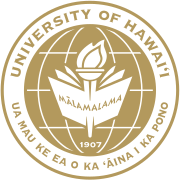Kapiʻolani Community College
This article needs additional citations for verification. (September 2022) |
 | |
| Motto | Kūlia I Ka Nuʻu (Strive for the Highest) |
|---|---|
| Type | Public community college |
| Established | 1946 |
Parent institution | University of Hawaiʻi System |
| Accreditation | ACCJC |
Academic affiliations | Space-grant |
| Chancellor | Louise Pagotto |
| Students | 6,899[1] |
| Location | , , United States |
| Campus | Urban |
| Colors | Blue and White[2] |
| Website | kapiolani |
 | |
University of Hawaiʻi Kapiʻolani Community College, formerly Kapiʻolani Technical School, is a public community college in Honolulu, Hawaiʻi. It is part of the University of Hawaiʻi System and accredited by the Accrediting Commission for Community and Junior Colleges.
History
[edit]Originally located at Pensacola Street and Kapiʻolani Boulevard (from which the school gets its name), adjacent to President William McKinley High School in the Makiki community, University of Hawaiʻi Kapiʻolani Community College was established in 1946 as Kapiʻolani Technical College.
The school was administered by the Territory of Hawaii as one of its chief vocational schools, specializing in food service. In 1965, its curricula was modified and became an open-door public college administered by the University of Hawaiʻi. As part of the realignment of programs, the school adopted its current name.
Expansion
[edit]Experiencing rapid growth in the 1970s, the Community College needed larger facilities. In 1974, the Board of Regents acquired a 52-acre (210,000 m2) parcel of land on the slopes of Diamond Head in Waikīkī, formerly owned by the United States Army. University of Hawaiʻi Kapiʻolani Community College opened its second campus at Fort Ruger, the only college in the University of Hawaiʻi System to have two campuses of its own.
The Board of Regents then agreed to move with a complete transfer of programs to the Fort Ruger campus and close the Makiki campus. University of Hawaiʻi Kapiʻolani Community College finally completed the transfer in the late 1980s.
Points of interest
[edit]Campus art includes:
- Spirit Way, bronze sculpture by Sean Kekamakupaʻa Lee Loy Browne, 1987
- Pohaku O Leahi, ceramic sculpture with water feature by Lucille B. Cooper, 1994
- Hawaii, Hawaii, faceted glass mural by Erica Karawina, 1988
- Mai Ka Mea Hana Ka ʻIke ("From Tools, Comes Knowledge"), basalt sculpture by Mark Watson, 1988
- Sol III, fiberglass and steel sculpture by Mamoru Sato, 1973
Notable alumni
[edit]- Jacob Batalon, actor[3]
References
[edit]- ^ "Kapiolani Community College: At a Glance | University of Hawaiʻi System".
- ^ "Brand Guide" (PDF). March 2014. Archived from the original (PDF) on July 9, 2022.
- ^ Erbland, Kate. (July 7, 2017). "Jacob Batalon: 5 Fast Facts You Need to Know". IndieWire. Retrieved January 24, 2022.
